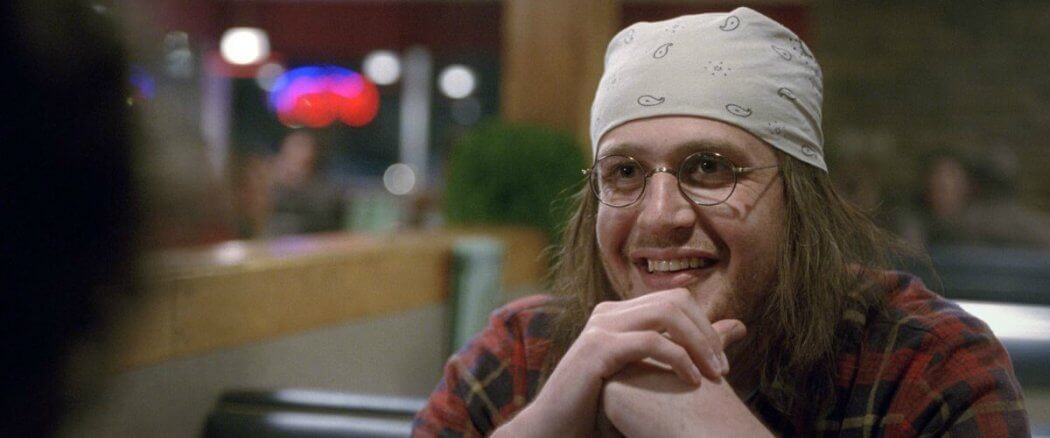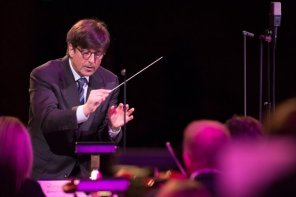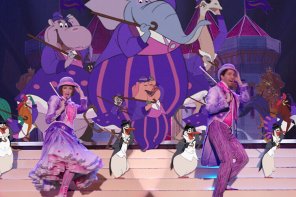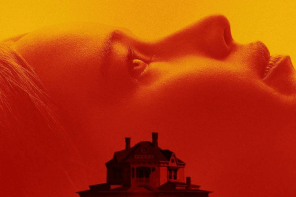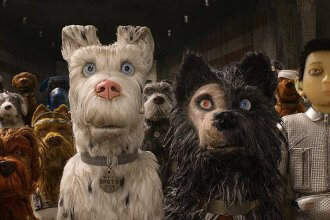Biopics are tricky things… then again The End of the Tour is not exactly that; it is not not one either, but it teeters. The biggest divergence is from the sort of hindsight we are provided with in films like Ray, or Walk the Line in which each step of the subject’s life sets them down a path that aligns perfectly into who they become. It’s all laid out very nicely on screen, avoiding the fact that, as Walker Percy puts it, “…most time passes and most events occur without notable significance.” In The End of the Tour, the most significant moment (David Foster Wallace’s suicide), is more the context to the value of these recorded conversations than the significant and cumulative moment.
We tend to simplify those we idolize. At first we notice and emphasize only the good of their life. We brush under shortcomings, foibles, and complete failings to come up with terms like “the greatest generation.” On the other end, we demonize and find any way to make an idol fall — look at the current and previous presidents, and how just mentioning their last names invokes an extreme negative and visceral reaction (sometimes inducing shoes to be thrown). The reality for both is something much more in the middle ground, more complex (just like any of us), and harder to pin down.
I get the sense that as time moves forward, immutably, we tend to become tired with the simplified heroic stories of predecessors, and we start digging up all the dirt we can. What is easy to appreciate about Tour is that it avoids this altogether and just looks at a moment, and the fragments within that.
What’s It About Then?
We don’t get that 20/20 narrative in Tour; only glimpses into two great minds feeling the ground out in between them. Julie Buntin, a student of Lipsky (played by Eisenberg), wrote a great piece* that reminds us: this movie is built around a new relationship between two people, both attempting to use and be liked/accepted by the other… which is how most human relationships end up working out, but this one has the more obvious factor of Lipsky writing a piece on David Foster Wallace for Rolling Stone, and DFW’s uncomfortable and explicit mixed feelings on the press Infinite Jest would receive from this.
If we wanted to be cliché, this movie, at its essence, is a bromance. I cringe at the thought of this label, but it’s hard not to title it as such. Tour follows most of the typical narrative movements of a romance, right down to the seemingly unforgivable fight that leads to greater revelation and insight into who each one is as a person. In fairness this is about the “lesser” romance, the love of Philia, of friendship more than romance.
Beyond the Formula Flick
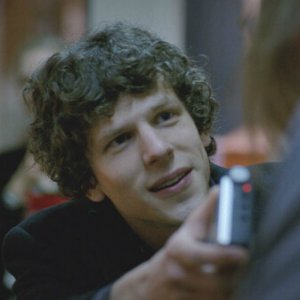 All of the romantic formula aside, this movie still resonates because 1) The dialogue is incredible (with most of it being taken directly from Lipsky’s recording/book – how could it not be?): the small insights into both of their (Wallace & Lipsky’s) thinking, the fast paced exchange of ideas, the still present humanity in one of the modern world’s unassailable idols; and 2) Eisenberg and Segel (DFW) give incredible performances. They made the whole film gleam with a genuine quality… in a nutshell, they both understand who they are portraying, what their motives are, and the nuance of their social pecking order and where/when those lines blur.
All of the romantic formula aside, this movie still resonates because 1) The dialogue is incredible (with most of it being taken directly from Lipsky’s recording/book – how could it not be?): the small insights into both of their (Wallace & Lipsky’s) thinking, the fast paced exchange of ideas, the still present humanity in one of the modern world’s unassailable idols; and 2) Eisenberg and Segel (DFW) give incredible performances. They made the whole film gleam with a genuine quality… in a nutshell, they both understand who they are portraying, what their motives are, and the nuance of their social pecking order and where/when those lines blur.
Another aspect that gets past the formula is that, outside of the need to be on tour, this movie holds a lot more in common with My Dinner with Andre. A good 90% (not actually calculated, just a best guess here) of the movie is conversation between Lipsky and Wallace. It’s a movie about two people exchanging ideas that fit into a bigger picture of what they expect life to be and become. There is not much plot, no real action, and, aside from a small tiff of ego and perception, almost no conflict… except for the internal impact of ideals and meaning and purpose that we witness via suddenly halted conversation, or subtle facial expressions of guardedness.
Loneliness
A bedrock of DFW’s writing, interviews, and certainly in Tour, is loneliness. Not just the momentary “I miss my childhood dog” sort of thing, but a lingering constant understanding that no matter how much effort you put forth you will always be an ‘other’. You will never be fully known, or understood, or worse yet you will be slightly understood but at the expense of being horribly misunderstood in almost every other way, and the image that somebody develops of you from this will maybe illumine some point you yourself are trying to hide (from everyone including yourself), or the wrong impression of what you are actually trying to accomplish.
There is a great moment that illustrates this. Lipsky is driving Wallace to the airport and asks him about his “trademark bandanna.” After explaining its practical origins, and its Linus’ blanket-like quality, Wallace becomes concerned that this will be viewed as an affectation with the end goal of selling more books. He looks away from Lipsky, “I really wish you hadn’t asked about that.”
These misunderstandings take place throughout their week together. They kill conversation, and what seems to be genuine connection. Very quickly they are brought back into the reality that each “wants”, for his own private reasons, something from the other. They both know it, and they both squirm whenever it comes into context. For Wallace, this selfishness permeates all relationships in varying degrees. It is the heart of loneliness, it is a holding on.
Commercialism and Consumerism
In Infinite Jest Wallace creates an alternate America in which years are no longer measured by date, but by corporate sponsorship (e.g. a large portion of the book takes place during The Year of the Depend Adult Undergarment). In Tour a lot of the conversation revolves around these issues. The conversations surrounding these topics are neatly accented by 1) the prominently displayed signs for fast food along the main road in Wallace’s hometown, 2) their visit to the Mall of America (including watching Broken Arrow), and 3) Lipsky and Wallace constantly purchasing and consuming candy and soda.
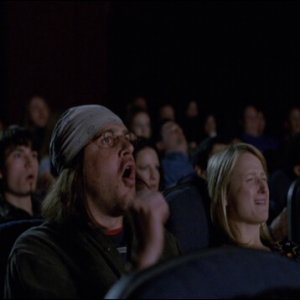 What was most interesting was how Wallace both rejected and embraced these things. It was part of the complicated person he was. On one hand you have “good commercial entertainment” that can become the main staple of your life and fill you with an empty and false sense of things. You eat candy and fast food, develop diabetes and gain weight. You sit and watch television 24/7, and instead of healthy relationships (such as marriage) you spend your time with pornography — that conversation is one of my favorite moments in the film — and this builds on and feeds loneliness and despair.**
What was most interesting was how Wallace both rejected and embraced these things. It was part of the complicated person he was. On one hand you have “good commercial entertainment” that can become the main staple of your life and fill you with an empty and false sense of things. You eat candy and fast food, develop diabetes and gain weight. You sit and watch television 24/7, and instead of healthy relationships (such as marriage) you spend your time with pornography — that conversation is one of my favorite moments in the film — and this builds on and feeds loneliness and despair.**
On the other hand, in moderation, these are simple pleasures that take us away from an extreme and despairing mindfulness*** — an awareness of the world/universes vastness that is out of our control and causes lightheadedness, sweating, and palpitations. In small doses they can contribute to an overall well-being, and an ability to unplug from realities that we are not able to fully comprehend… the realness of which is just as destructive as living off of Skittles (i.e. you can become morbidly obese eating Kale wafers — if you are consuming on a mass scale you will add mass).
Is the Grass Really Greener?
From the onset you get this idea that Lipsky is envious of DFW’s status. It starts with a book review stating (in essence) stop all serious writing, Infinite Jest is the hands down winner of awards this year. Lipsky scoffs at first, and in the next shot we see him reading and halfway through Jest closing the book and simply exclaiming, “Shit!” In the special features Ron Livingston (yes, the same guy who didn’t get the memo on those TPS reports) makes an astute observation: Wallace was like the Mozart and every other author was Salieri. What was interesting, as in Lipsky’s case, is that these “enemies” usually turned into fan boys.****
Throughout the interviews Lipsky hints at this jealousy. He scoffs at the idea of incompleteness or sadness on the part of DFW because, in Lipsky’s eyes, Wallace has everything any aspiring author could ever want and more. On the flip-side DFW is quick to point out how he wishes things were different. “It’s all well and good to joke around about getting laid on the tour, but what I really wish was that I was married,” Wallace says. There is a constant dissatisfaction and the friction of jealousy rubbing soft, but constant.
Ambivalence
At the end, literally, figuratively, or as a play on words (you take your pick), everyone (Lipsky, the screenwriter Margulies, the director Ponsoldt, and the viewing audience/world at large) are left hanging on: what do we make of this deep, searching, and impactful life that was taken by his own hand? I think we all reacted in a similar way when news of Robin Williams broke, and the meme of “You’re free genie” was being passed and posted. I don’t label myself a fan of this sentiment, nor do I consider myself a fan of the film’s closing impressions.
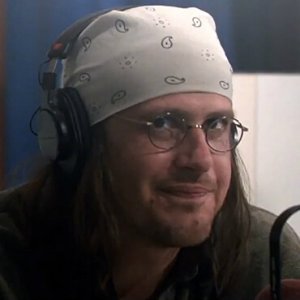 As a public audience not privy to DFW’s private demons we want to justify his life despite his suicide — because we loved his work so much, and his writing was a reflection of something of his internal make-up… we loved it and so we loved him. We want to imply some sort of peace — hence the film ending with his dancing in the church. We want the story to be a happy one, even though it’s sad and largely unknown. I REALLY don’t want to speculate on the results of suicide and one’s soul. There are enough people who have logically***** and clearly stated theological ramifications for an act of despair. I don’t think I can lean one way or the other — towards freedom or perdition — neither seems to fit absolutely, there is too much we do not know and/or understand about God to make that verdict.
As a public audience not privy to DFW’s private demons we want to justify his life despite his suicide — because we loved his work so much, and his writing was a reflection of something of his internal make-up… we loved it and so we loved him. We want to imply some sort of peace — hence the film ending with his dancing in the church. We want the story to be a happy one, even though it’s sad and largely unknown. I REALLY don’t want to speculate on the results of suicide and one’s soul. There are enough people who have logically***** and clearly stated theological ramifications for an act of despair. I don’t think I can lean one way or the other — towards freedom or perdition — neither seems to fit absolutely, there is too much we do not know and/or understand about God to make that verdict.
A Graham Green quote I always think of is this: “You cannot conceive, nor can I, of the appalling strangeness of the mercy of God.”
Tidying Things Up
I really like this movie. I really want to give it something higher than a “B”, especially on a sentimental level. On the other side, I really struggle to validate something as nearing greatness that is so dismissive (and almost revels in the whole tortured genius thing — as do most DFW postmortem fan fairs) of suicide because of who the man committing it was.
Then there is the aspect that Wallace would probably excrete bricks over this movie being made — simultaneously he’d probably love it, and spin into extreme cycles of anxiety and levity. This is a lesser factor, but his anxiety over exploiting fame for personal gain does make you question (however noble the attempts to do otherwise) the exploitative nature of this movie.******
But, if it meets the production crew’s stated goal (to expose some people to David Foster Wallace, and encourage them to pick up one of his books) I’m all for it; because in the end it’s a great conversation.
______________________________________
*Ms. Buntin’s article was posted July 24th, 2015 in Electric Literature, and is well worth the read: The End of the Tour: A Look at the Rapid-Pace Brains of Two Literary Greats
**The beauty of Wallace is his ability to see and show this Unified Theory of Life. Each problem is connected to, and feeds the other. There is a connection between fallenness and this sense that something in our lives is missing, and a way that it manifests beyond oneself individually, and into a more global/corporate sense — in Christianity we call this our fallen nature.
***In DFW’s commencement speech (here is the link: David Foster Wallace – Commencement Speech) he refers to the mind as “…a wonderful servant, but a terrible master”.
****A solid example is the case of Dave Eggers, who authors the most recent forward to Infinite Jest, and how he put forth one of the most scathing initial reviews of the book.
*****I would hesitate to use anything other than Dostoyevsky’s understanding of logic — something that precipitates from a false understanding of the fundamental things and is, therefore, difficult to argue against, but not outright unassailable, or even accurate for that matter.
******In many ways I am glad that this was exploited. It’s something I wanted. But, then you’re left with a sort of personal moral quandary in which you have to wrestle with the fact that the only way this is possible is because of DFW’s death. Does this mean your excitement is, in part, due to his finally being dead long enough to make something like this, something that would have been explicitly against his wishes?

